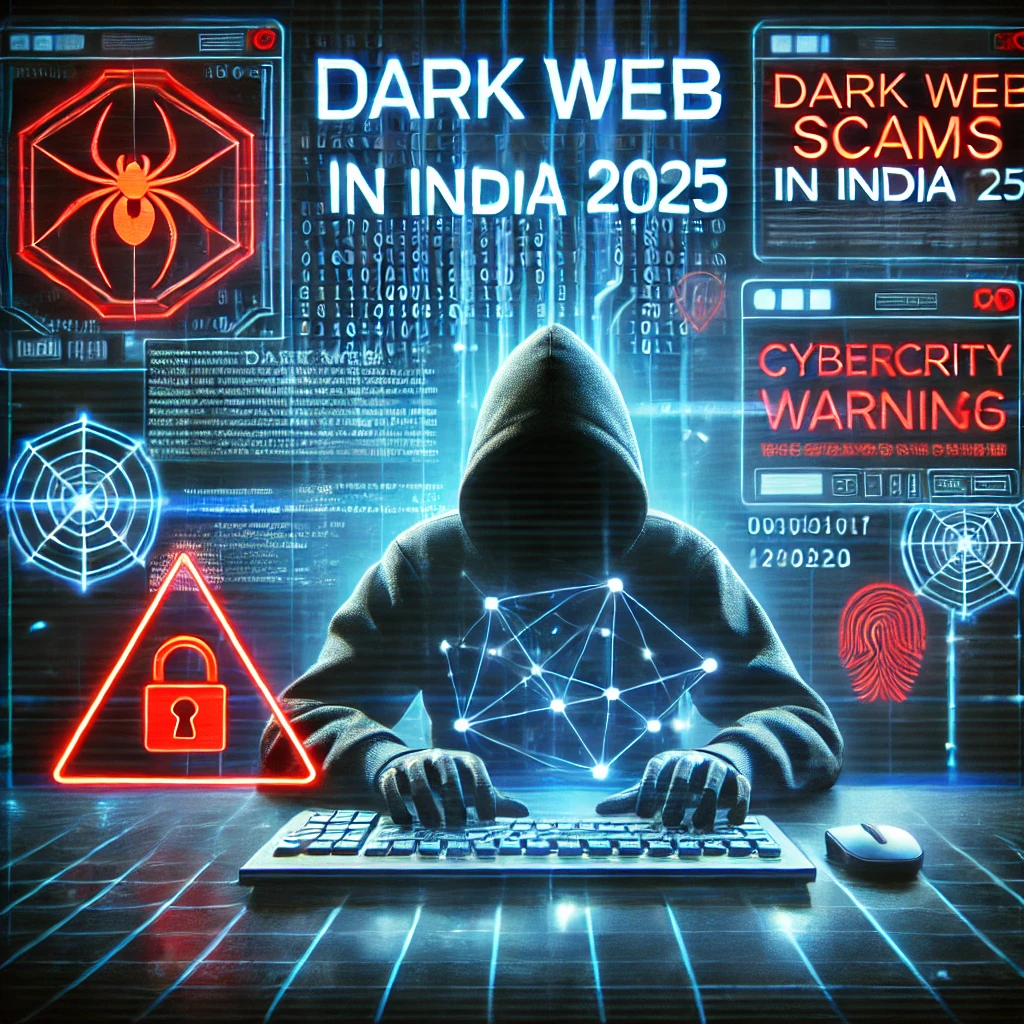Dark Web Scams in India: Keeping Cybercriminals at Bay 2025

Did you know the dark web makes at least $500,000 every day from illegal stuff? This shows how big a problem cybercriminals are in India and worldwide. The dark web is a small part of the internet but very dangerous. It’s where people can hide their identities.
In India, knowing about dark web scams is very important. The rise of cryptocurrency has helped the dark web a lot. It makes it easy to do secret, hard-to-track transactions. This has led to more illegal activities, like drug sales and hacking services. So, it’s key to know about these dangers to keep your info and stuff safe.
Key Takeaways
- The dark web generates significant revenue, approximately $500,000 daily from illegal activities.
- Cryptocurrency allows for untraceable transactions on the dark web.
- A substantial portion of personal documents is available on the dark web, heightening the risks of identity theft.
- The dark web is a breeding ground for various scams targeting unsuspecting individuals.
- Being aware of the threats posed by dark web scams in India is essential for online safety.
- Law enforcement is actively working to combat the rise of dark web-related crimes.
Understanding the Dark Web and Its Risks
The dark web is a part of the deep web, hidden from regular search engines. It needs special software like Tor to access. It’s much smaller than the surface web, which is only about 5% of the internet.
The deep web makes up about 90% of the internet. The dark web is a hidden part of that. It’s known for illegal activities and scams.
What is the Dark Web?
The dark web is famous for illegal activities like drug sales and weapons trading. It also has scams that aim to trick users. These scams can steal your identity and personal info.
Using the dark web can expose you to malware and other cyber threats. It’s full of dangers, including keyloggers and ransomware.
How the Dark Web Differs from the Surface Web
The surface web is easy to find and use, with content indexed by search engines. The dark web, on the other hand, is hidden and needs special browsers to access. It’s a riskier place, with more malware than the surface web.
Because it’s hidden, the dark web attracts cybercriminals. They use it to harm unsuspecting users.
Types of Scams on the Dark Web
Scams on the dark web target people looking for privacy or illegal services. Here are some common ones:
- Identity Theft: Scams to steal personal data like passwords and bank details.
- Financial Fraud: Scams that ask for money upfront but don’t deliver.
- Illicit Trade: Websites selling illegal goods often trap users.
Knowing about the dark web and its dangers helps protect you from scams and risks.
Dark Web Scams in India: How to Stay Safe from Cybercriminals

Cybercrime in India has grown, leading to scams on the dark web. These scams are hard to spot. It’s vital for internet users to stay alert to avoid risks. Knowing how to spot dark web scams can protect you from cyber threats.
Common Scams Targeting Indian Users
Scammers in India use clever tricks to fool people. Here are some common ones:
- Vishing: Scammers call from fake international numbers, saying your info is on the dark web. They rush you, saying you must act fast to avoid trouble.
- Deepfake Technology: This tech lets scammers make fake videos or audio of famous people. They use it to spread lies or steal money.
- Phishing Scams: Scammers send fake messages asking for your personal or financial info. They pretend to be real companies to get your details.
Recognizing Signs of Dark Web Scams
It’s important to know how to spot dark web scams. Here are some clues:
- Any message asking for your personal info without asking is likely a scam.
- Scammers try to rush you, saying you’ll face legal trouble if you don’t act fast.
- Government calls or messages with automated voices are usually scams. Real government calls are rare.
Keep an eye on your online accounts for any odd activity. Use strong passwords and two-factor authentication to protect yourself. Being aware and cautious can help you avoid cyber threats.
Protecting Yourself from Scams
In today’s digital world, it’s key to stay ahead of scams. Cybercriminals are getting smarter, so strong online security is a must. By using smart strategies, you can lower your risk of online threats.
Implementing Strong Security Measures
Start by making sure your passwords are strong and different for each site. A password manager can help with this. Adding two-factor authentication (2FA) makes it harder for hackers to get into your accounts, even if they know your password.
It’s also important to keep your software up to date. Old software can have holes that hackers can use. Using a VPN when on public Wi-Fi can also protect your data from snoops.
Online Safety Tips to Avoid Falling Victim
Watch out for phishing scams. Be wary of emails or messages that seem too good (or bad) to be true. Look out for messages that ask for personal info or have strange links.
Teaching your family about safe online habits is important. Backing up your data regularly can help if you get hit by ransomware.
| Online Safety Tips | Actions to Take |
|---|---|
| Use Unique Passwords | Implement a password manager to create and store strong passwords. |
| Enable Two-Factor Authentication | Activate 2FA on accounts for added protection. |
| Keep Software Updated | Regularly check for updates on all devices. |
| Be Cautious of Phishing | Verify the sender’s information before clicking links or sharing personal details. |
| Educate Family Members | Discuss online safety practices within the household. |
By following these steps and staying alert, you can keep your online world safe. This way, you can avoid falling prey to cyber threats.
The Role of Law Enforcement in Combatting Dark Web Crimes
Law enforcement in India is key in fighting dark web threats. The Cyber Crime Coordination Centre (I4C) helps agencies work together better. This leads to stronger strategies against cybercrime.
Cybercrime attacks have jumped by 31% from 2020 to 2021. Agencies are working hard to track and stop these crimes on the dark web.
Indian Cyber Crime Coordination Centre and Its Efforts
The I4C is a central agency for fighting cybercrime. It uses advanced tech and shares intelligence to watch the dark web closely. About 57% of the dark web is for illegal activities, making constant vigilance crucial.
On average, a cyberattack can cost a business up to $200,000. This puts a lot of pressure on companies.
It’s important for law enforcement to understand the dark web. Many businesses fall victim to cyberattacks and often fail within six months. The I4C focuses on both stopping and preventing cyber threats.
International Cooperation in Tackling Cybercrime
Working together internationally is crucial in fighting cybercrime. Indian law enforcement teams up with global agencies to share info and strategies. This helps take down organized cybercrime groups.
Being part of international forums helps tackle complex cyber threats. For example, the WannaCry ransomware attack affected many countries. Collaboration is key to stopping threats before they get worse.
Strengthening ties with international law enforcement is vital. It helps find cybercriminals and tackle crimes that cross borders. As cybercrime grows, working together becomes more important to protect our digital world.
Conclusion
The world of cybercrime is always changing, making it key to stay informed and educated. Scams are on the rise globally, showing how important it is to be careful. In India, about 20% of cybercrime cases are linked to the dark web, highlighting the need to understand these threats.
To protect yourself, start by using strong security measures and learning about cybercriminal tactics. Law enforcement is working hard to fight these crimes, but you also play a big role. Working together, we can tackle the problem of cyber insecurity.
In today’s digital age, staying alert is essential. Learn how to protect yourself online and use the strategies we’ve discussed. By doing so, you help fight cybercrime and make the internet safer for everyone.
FAQ
What is the dark web?
The dark web is a part of the internet that’s hard to find. You need special software, like Tor, to get there. It’s not listed in regular search engines and is linked to illegal stuff.
How does the dark web differ from the surface web?
The surface web is easy to find and use. It’s indexed by search engines. The dark web, on the other hand, is hidden and needs special tools to access. It’s often used for illegal activities.
What types of scams are prevalent on the dark web?
Scams on the dark web include identity theft and financial fraud. They also sell stolen data. These scams aim to trick people and cause big losses.
What are some common scams targeting Indian users?
In India, scams like phishing and fake job offers are common. They ask for personal info on social media. These scams are designed to trick Indian internet users.
How can I recognize signs of dark web scams?
Watch out for emails asking for personal info and links to unknown sites. Be careful of messages from unknown sources. Always be cautious of unsolicited messages.
What security measures should I implement to protect myself from scams?
Use strong passwords and multi-factor authentication. Keep your software up to date. These steps help protect your online security from cyber threats.
Are VPNs effective in preventing dark web scams?
Yes, VPNs encrypt your internet and hide your IP address. This makes it harder for scammers to track you. It’s a good way to stay safe online.
What proactive measures does law enforcement take against dark web crimes in India?
The Indian Cyber Crime Coordination Centre (I4C) fights dark web crimes. They work with other countries to stop criminal networks. This helps fight cybercrime better.
How can I report suspected dark web scams?
If you think you’ve seen a scam, tell the police or cybercrime units in India. Giving them details helps them catch scammers and keep others safe.

